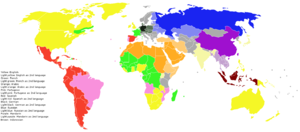
You've just arrived in a less developed country or community. The language is different and the culture is different - not to mention the food. You came because you want to help, but where do you start?
Start by learning and being open to understand. The most important thing you can do to help is to not try to change things or start projects straight away, but to understand what is needed.
Key areas to be prepared for are health, security, conflict, language and culture, and project management (if working on a project).
Language[edit | edit source]
Start to learn the language before you arrive. How you approach it depends on your learning style, but as a start:
- If at all possible, live with locals (who don't speak your language). and speak their language, and spend time with locals outside of work or class.
- Learn how to say "What is that?" "What is this?" and "What does... mean?" and use them constantly.
- Take classes, at least for the beginning of your stay. This makes an enormous difference in adapting and learning about the culture and language.
- Listen - even when you don't understand the words, being exposed to the sounds can help. Music with clear lyrics can help.
- Take classes in the beginning of your stay. Once you have the basics, you can decide how much more formal learning you need (but occasional classes will benefit you as you continue to learn).
- See Wikibooks:How to Learn a Language for more ideas.
Culture[edit | edit source]
Learn the culture.
- Read some history
- Ask questions politely - curiosity about the culture is usually appreciated, and they will often be curious about you.
- Observe.
- Remember that just because someone in that culture acts in a certain way, doesn't always mean it's "culturally acceptable".
Context[edit | edit source]
Learn the context - the social, economic, environmental and institutional challenges. Learn how people tackle these problems now. Learn what programs have addressed and continue to address these problems, and what their successes and failures are.
If you're interested in positive change, understand the base that you're starting from.
- Talk to people. Take Paul Polak's advice: "Talk to the people who have the problem – and LISTEN to what they have to say."[1]
- Ask questions.
- Read
- Get out there - walk the streets, and travel the country. (Be aware of your personal safety, of course.)
- Observe
Know your own work[edit | edit source]
Having a skill to share is valuable - once you know the context. Being prepared beforehand with a good education is important. You can also continue to learn by making use of open educational resources.
Educate yourself about the process of aid and development. Many mistakes have been made and continue to be made - learn from them. Start at Resources for aid and development workers and read widely.
For more reading, see What is our true job? , Aid Worker: First, Know Thyself, and A New Discipline for Development Practitioners on how-matters.org
See also[edit | edit source]
References[edit | edit source]
- ↑ Pop!Tech: Paul Polak on Scaling the Bottom of the Pyramid, October 22, 2008